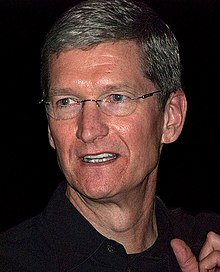SMARTPHONES: Apple CEO Caught in Hard Place in US-China Tensions
Bottom line: Apple’s Tim Cook and other big global CEOs active in China will need to walk a fine line to avoid being forced to take sides in ongoing US-China trade frictions.

Apple (Nasdaq: AAPL) CEO Tim Cook was in China once again this past weekend, in what seems to be becoming his second home. This time around Cook was one of the few corporate chiefs attending the China Development Forum, a major annual conference sponsored by China’s State Council. The event is mostly peopled by academics and government officials, and thus Cook’s attendance is both a feather in Beijing’s cap and also something of a nod to Cook’s own status as a global high-tech titan as he tries to stay in the nation’s good graces.
His major proclamations at the event weren’t all that earth-shattering. But he inevitably felt compelled to comment on the Donald Trump administration’s announcement last week of new punitive tariffs on China for unfair trade practices. He didn’t venture too far into the matter, and mostly urged both sides to stay calm in the face of rising trade tensions between the world’s two largest economies.
None of this is too surprising, since Apple has a huge amount at stake in this particular issue. Its biggest global market is the US, while it makes most of its products in China. What’s more, Greater China is also one of its largest markets, accounting for about one-fifth of its sales in its latest reporting quarter, or about $18 billion to be exact.
So how does one of the world’s highest-profile corporate chieftans walks such a fine line? Very carefully, or so it appears. In his remarks at the forum, Cook was quite diplomatic, saying he was aware there were cases where “everyone hasn’t benefited” in the US-China relationship. (English article) That’s an unsubtle reference to Trump’s complaints about China’s large trade surplus with the US.
It also refers to other frequent complaints from Americans and other foreigners that China’s markets are relatively closed compared with the market access given by western governments to Chinese companies. China has promised on numerous occasions to open its markets to level the playing field, but has fallen into the common pattern of dragging its feet for years without taking concrete actions.
In his remarks at the forum, Cook gave the rather bland comment that businesses should engage with governments in the countries where they do business. He added that all sides should look for mutually beneficial arrangements where “one plus one equals three.” He has certainly practiced what he preaches, making at least one trip to China in each of the years since assuming the mantle as Apple’s CEO.
Matter of Choice
In all fairness, Cook has a point. Despite all of the complaints by foreign companies, nobody has forced them to do business in China. They are all here because of China’s huge market potential, despite all the barriers that Beijing puts in their way. Government relations are key to overcoming many of those barriers, which is something Cook has learned the hard way over the years.
Apple is a good case of a company that has done its best to navigate all those barriers, and as a result has made good profits in the market just a decade after entering in earnest. That navigation has meant lots of bumps along the way, including a scandal a few years back that tarnished the company’s reputation due to shortcomings in its after-sales service. The company has also been forced to store all data for China-based users of its iPhones within China, in response to Beijing’s national security concerns.
Cook’s frequent travel to China is no doubt filled with discussions of such issues behind closed doors, followed by frequent consultations with his PR team over how to handle disclosure to the public of sensitive moves. But in the end his work appears to have borne fruit.
Against that backdrop, the bigger question is whether companies with far less resources should be forced to jump through so many hoops in exchange for a chance to successfully do business in China. The answer really should be “no”, considering Chinese companies have far less obstacles when doing business in America or other western markets. At the end of the day, I should applaud Cook for Apple’s success in China and his overall approach calling for regular discussion.
But smaller companies probably don’t have the time or resources to dedicate to such efforts, which is what’s driving the broader frustration being felt by the foreign business community. Until that issue is addressed, we’ll probably continue to see trade frictions show up as a major issue, keeping people like Tim Cook caught in a difficult in-between place as they try to refrain from taking sides.
